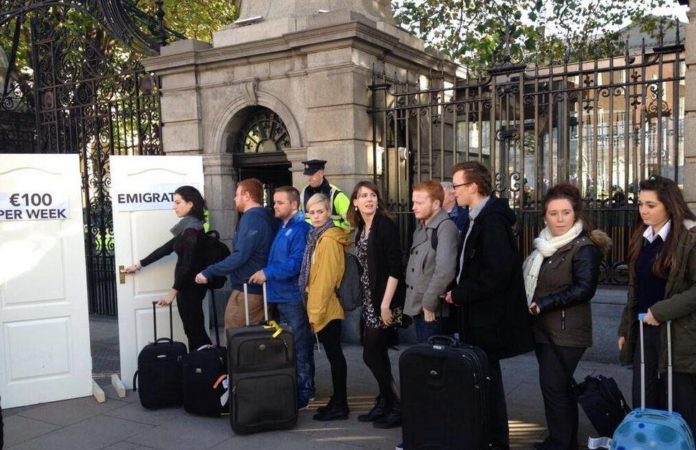“The place for any young person is not permanently in front of a flat screen television” former Labour leader and then Tanaiste Eamon Gilmore told the Dail in 2013 in a vain attempt to justify his government’s slashing of dole payments for those aged under 25; those plunged to just €100 a week.
At the time, in the midst of the economic crisis, youth unemployment stood at 28%. The cut to dole payments was accompanied by a raft of so-called ‘labour activation’ measures. These included the much-hated JobBridge scheme which saw unemployed people put onto ‘internships’, working a full week for €50, or having their already meagre dole penalised further.
These measures combined to tell young people they weren’t wanted here. This acted as a push factor for thousands of young people to emigrate, never to return.
The justification for these measures were that young people were lazy, they would rather sit at home pocketing the dole than work; thus, they needed to be ‘encouraged’. But by introducing these free labour schemes the government reasoned, it was actually doing young people a favour(!). Their argument was that some young people had no work experience therefore couldn’t get a job, so they could gain experience by working for free for 9 months.
You see, mass unemployment wasn’t a systematic failure it was actually you, as an individual, who was to blame.

When I launched the Scambridge campaign to oppose this exploitative scheme, it was clear that JobBridge wasn’t doing young people any favours but was, instead, a gift to bosses. Rather than hire and pay someone to work, companies now had a government approved free labour scheme which they could exploit. The result was that many entry level or low paid jobs became internships (car valets), companies took on free interns rather than hire people (forecourt attendants), and in some cases used the scheme to replace positions which were previously paid jobs. This increased profits and helped to depress wages.
By the time JobBridge was scrapped it was thoroughly hated because of its widespread abuse and its very low success rate in getting people paid employment.
Today, in the midst of a new crisis, the same ideological drums are starting to beat again. Bosses are complaining of difficulties getting staff because welfare is too high (it’s like ‘winning the lotto’ according to Supermac’s Pat McDonagh). It needs to be cut because of the same right-wing tropes: flatscreen tvs, laziness, social media, Playstation.
As of the end of April, 61% of young people are out of work and receiving the PUP payment. As the economy opens up some will return to work but many won’t. Youth unemployment, beyond any levels seen previously, will become a reality.
So the question is posed: will JobBridge make a comeback?
The truth is that the ‘labour activation’ edifice which it was a key part of has never gone away. Out went JobBridge and some of the more exploitative schemes like Gateway (€1 an hour working for a local council) but these were simply replaced by other similarly exploitative schemes like JobPath.
The government has already indicated in their 2020 July Jobs Stimulus Package that labour activation schemes will form a major plank in their response to the crisis. While JobBridge in its previous form may not return, there will likely be an intensification of the current schemes, with a wider net being cast to force people into them, alongside a raft of new penalties to punish those who refuse, and an accompanying public campaign to demonise the unemployed as feckless.
A repackaged JobBridge 2.0 will be on the agenda – it will likely rest on the same old arguments about needing to gain ‘work experience’ or ‘new skills’ with a mea cupla about having got rid of the worst abuses of the original scheme. But, at root, it will function on the same principle of unpaid work and undermining the concept of universal benefits and the welfare state.

Unlike the previous crisis, emigration on the vast scale seen during the 2010s, is unlikely to be an option because of the pandemic. So, the only option for people will be to fight not only whatever new scheme is introduced, but the Welfare to Work model as a whole.
The first step in doing this is to defend the increased welfare rates of the Pandemic Unemployment Payment, a payment which the government has in their sights. This is essential if young people are not to be starved into exploitative schemes.
Secondly, we need to demand expanded access to free education with all the necessary financial supports, plus decently paid apprenticeships for those who want to upskill or expand their skills and learning.
Thirdly, there needs to be mobilistions of people to demand that a Jobs Programme – rather than free labour schemes – is funded. This could be part of an eco-socialist Green New Deal which sees a massive expansion of green jobs into areas like health, care jobs, renewable energy, and childcare which can provide well paid jobs and a future for young people.
–
Paul Murphy (@paulmurphy_TD) is a People Before Profit TD for Dublin South West and a member of the RISE network.





